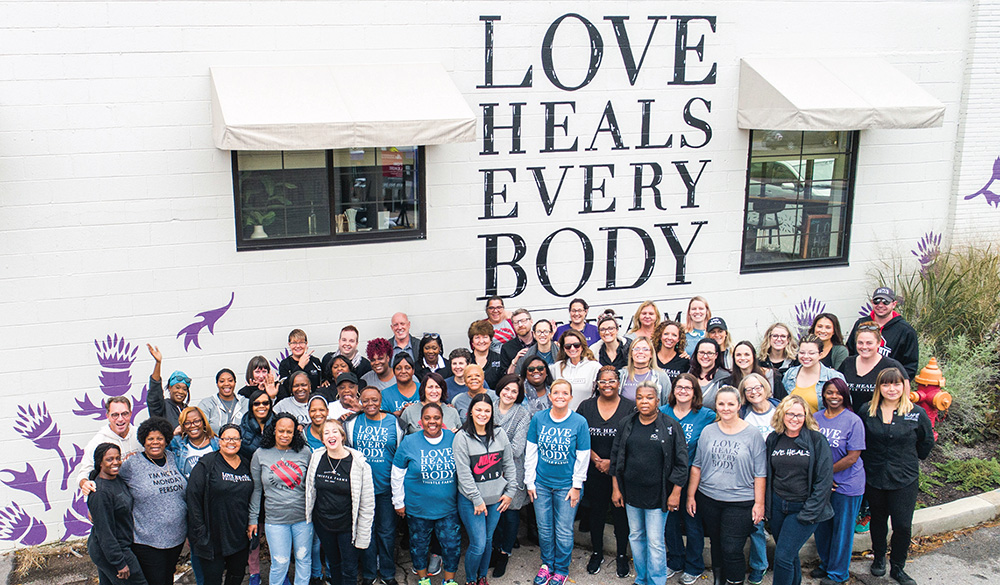As many as one in four women and one in nine men will experience domestic violence, also referred to as intimate partner violence (IPV), in their lifetime. This staggering statistic illustrates how prevalent IPV is in communities around the country.
While the term often brings to mind physical assault, domestic abuse can also include:
-Emotional
-Financial
-Verbal
-Sexual
-Psychological abuse are also forms of domestic violence.
It’s an issue that permeates every community and it does not discriminate against race, social class, geography, or age. Some of the most profoundly impactful work being done to prevent domestic violence comes from organizations big and small within communities.
Throughout the United States, these entities work intimately with their region to prevent domestic violence. These entities provide safe and supportive environments for domestic abuse survivors, and empower individuals to heal.
In recognition of Domestic Violence Awareness Month, we’re highlighting partners and Impact Partners creating impactful action against domestic abuse.
Education with Compassion
One of the foremost strategies to stop domestic violence is to impart knowledge early on what makes a safe and respectful relationship.
According to the CDC, “nearly 1 in 11 female and approximately 1 in 14 male high school students report having experienced physical dating violence in the last year.”
Teen dating violence often sets the stage for long-term issues with establishing healthy relationships. Trauma in formative years can result in:
-Depression
-Substance abuse
-Other severe consequences on developing young adults, their families, and the communities in which they live
Therefore, intervening during a teen’s early years to educate them on what makes a healthy, respectful, and nonviolent relationship is crucial.
Teaching teens how to:
-Communicate
-Manage difficult feelings
-Set and maintain personal boundaries
Can help reduce the behaviors that lead to teen dating violence.
Junita Flowers, founder and CEO of Junita’s Jar, knows that open communication and empowerment can go a long way in educating and healing from difficult situations. A survivor of relationship violence herself, Flowers uses her product — delicious cookies— as a meet point of understanding and openness.
Her seminar, Cookies and Conversations, brings the discussion of relationship violence, resilience, and healing to students at local universities.
Through a panel discussion led by experts, the seminar tackles the tough topic surrounding relationship violence and provides tools and an environment of support to college-age students.
Strengthening Economic Supports
Another critical education component is financial independence and security.
Economic abuse, in which one’s intimate partner controls or limits their access to resources or assets, occurs in 96% of domestic violence cases. Individuals under this restrictive control are trapped into dependency on an abusive partner, making it difficult for them to leave their abusive partner or forcing them to return after leaving.
Packed with Purpose client, The Allstate Foundation, works to address this abuse by providing domestic violence survivors with the education they need to help them achieve financial independence.
The Allstate Foundation Moving Ahead Curriculum, free for survivors and nonprofit advocates, is a five-module program that has been academically validated to help prepare survivors as they move from short-term safety to long-term security.
Since 2005, The Allstate Foundation has invested more than $85 million to empower victims with the tools to achieve financial independence and a life free from abuse and to educate young people on the elements of healthy relationships to help stop abuse before it starts.
Empowering survivors through employment
Another crucial form of support comes in the way of healing and sanctuary.
For Impact Partner Thistle Farms, this looks like:
-Safe housing
-Healthcare
-Counseling
-Job training for women survivors of domestic violence.
Through their residential program, social enterprise, and partnership with national networks, Thistle Farms takes a holistic approach to help women recover from violence, trafficking, prostitution, and substance abuse.
The numbers alone speak volumes: Thistle Farms has provided over:
–6,900 nights of safe and supportive housing
-More than 100,000 hours of employment for women survivors
-75% of their graduates are living healthy, independent lives five years after their residence.
A survivor of childhood abuse, founder Becca Stevens longed to create a safe environment to help women become financially self-sufficient and heal through community.
The two-year residential program houses 28 residents at a time in a therapeutic and holistic setting grounded in accountability, trust, healing, and growth. Through their social enterprise, residents receive employment, soft and technical job training, and a savings match to provide scaffolding for a successful life following the program.
Gainful employment is a necessary step in allowing survivors of domestic violence to develop financial security and create new connections necessary to move on.
Other purveyors, such as Together We Bake and Women’s Bean Project also work to provide women with workforce skills to lift them out of poverty and provide a better path towards self-sufficiency. In providing a safe space for survivors to realize and build on their potential, these ventures are helping to break the cycle of abuse through empowerment, love, and respect.
Building change through conversation
Domestic violence is prevalent in our communities and will continue to affect our friends, families, and neighbors without interventions.
Knowing the signs of abuse, how to reach out and listen to survivors are steps all individuals can take to reduce instances of domestic violence. By supporting the organizations that dedicate their businesses to educating, protecting, empowering, and caring for domestic abuse survivors, we can work together to build better outcomes for those in need.
